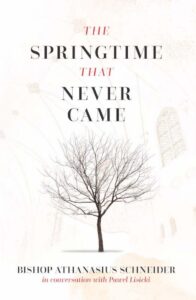 Even in the typically Catholic circles I find myself in most days, Dietrich von Hildebrand isn’t exactly a household name. In fact, I only discovered his works by accident while doing some school work. If you have never heard of this man, I encourage you to learn who he is from this book review, and go get the book for yourself. You need to know about this man’s work and life!
Even in the typically Catholic circles I find myself in most days, Dietrich von Hildebrand isn’t exactly a household name. In fact, I only discovered his works by accident while doing some school work. If you have never heard of this man, I encourage you to learn who he is from this book review, and go get the book for yourself. You need to know about this man’s work and life!
Edited by John F. Crosby and his son, John Henry Crosby, My Battle Against Hitler is a unique book that contains both selections from von Hildebrand’s memoirs of his experience waging an intellectual and cultural war against the Nazis from 1921 to 1937, as well as essays and newspaper articles written during that same time frame. The memoirs, a small sampling of the over 5,000 pages of handwritten journals that Hildebrand wrote, were originally written because von Hildebrand’s wife, Alice, who married him later in life, had never heard many of the stories of his war-time activities.
A Story of a Conscience
What pervades the memoirs throughout is how fiercely Hildebrand follows his conscience. Here’s a man who is a philosopher and theologian, and whose deepest identity is rooted in the Catholic faith. Yet he finds himself living in a time when the National Socialists begin to rise in his own country. What would you do in this situation? Many, certainly, would be tempted to silence, or to find common ground.
Not Hildebrand. He ardently, and publicly, admitted that “I am first a Catholic, then a Catholic, and yet again a Catholic, and so on and on.” For this frank admission, way back in 1921, he would be branded a traitor.
This label of a traitor would follow him, sometimes with more, sometimes less, seriousness depending on the political situation at hand, until Hitler had outright seized power. In fact, during Hitler and the National Socialist’s rise to the top, Hildebrand becomes an on-again off-again member on Hitler’s list of prime enemies. What’s most fascinating about the book, and Hildebrand’s memory of the events, is that he saw the evil roots of the ideology right from the beginning, before they had even begun to spread. For instance, in 1921 he was already complaining of “value blindness and the loss of any sense for the horror of murder, which had permeated German public opinion.”
A Story for Today
Reading this book, countless times, I found myself thinking “This is exactly what’s happening today!” Certainly, we don’t live in an era where we have a real Hitler to deal with, but the ideas and the problems are nonetheless very similar. Hildebrand fought tooth and nail, with his words and his witness, to show that above all, it is truth that matters, not race, political party, power, comfort, etc.
When we are tempted to put other things (popularity, for instance) ahead of the role of truth in our own life, we should look to the witness of someone like Hildebrand. He was a very public figure whose lectures were widely popular and well-attended. Yet, he never held back, nor, worse, engaged in any kind of softening of the message. For him, integrity was key.
When he saw others around him trying to find ways of accommodating the Nazi regime with their faith, or trying to find an apologetic way to reconcile anti-Semitism with their Christianity, Hildebrand rallied against this. This was particularly inspiring to me. Imagine how many people, how much pressure (both spoken and silent) there would have been for a good German to go ahead and give in.
Admit it already! Obviously the Nazis are going to take over, so wouldn’t you rather be on their side and avoid their wrath? Hildebrand’s answer was crystal clear: “What good is obtained when people who consider themselves Catholic and who still receive the sacraments adhere to ideas that are incompatible with Christ?”
To my mind, Catholics engaged in so many different culture wars really need an inspiring model to look up to every now and then. Whether the question is contraception, the redefinition of marriage, divorce and remarriage, etc. there are a number of fronts on which it looks like our odds are slim. Hildebrand faced a similar scenario, and it was more than just ideas or points in a debate that he saw at risk. He of course risked his life, but he also saw a culture at risk, a country at risk and above all, the concept of the human person hanging in the balance.
For that, he went to any and all lengths to defend the truth. He was on Hitler’s short list for assassination on the evening he overthrew Vienna, and Hildebrand escaped only hours before the assassins arrived. The car he was traveling in stalled many times and he and his wife wound up having to stay in Vienna overnight and leave the following morning. That kind of bravery, that unwillingness to give in to cultural changes that harm the truth and dignity of the human person is a voice we need to hear again.
Timeless Essays
Perhaps the most fascinating part of this book is the essays and newspaper columns that fill the end of the volume. These selected essays show the work that Hildebrand was engaged in on a daily basis to fight the ideological errors of Nazism and indeed of any collectivism. Though it represents only a small sampling of the work he published during that time, the Hildebrand Legacy Project has plans to translate the entire collection and put it all online in the future.
One essay, from September of 1936, highlights the way in which a civil, public society, even if it is not explicitly Christian, depends on a Christian formation and Christian foundation to remain functional and civil. This essay could very well be a field manual for doing apologetics in America today. He highlights four qualities:
1. A profound reverence for truth.
2. The conviction that there is an objective moral law which is independent of all subjective interests, arbitrariness, and mere power.
3. The primacy of the spiritual sphere over the material.
4. The dignity of the human person.
These four ideas are so crucial to a healthy society, and each of them comes from the Christian patrimony. We need to cling to them, and we need witnesses like Hildebrand to keep us on track amid the many conflicting ideas that fill our world today.
Pax,
Luke






4 thoughts on “My Battle Against Hitler: A Review”
Excellent article indeed. Thanks to Luke from Aikkarakanayil Augustine Jose, India
Pingback: Why Pope Francis Is Demonize Practicing Catholics -Big Pulpit
Luke…thank you for getting the word out about this book. I am only a quarter of the way through but I keep having this feeling of utter GRATEFULNESS to be reading about this man and his work. Being a mother of five what I find most interesting is that Von Hildebrand fell deeply in love with God around the age of six. He was brought up in a family that loved BEAUTY, so I keep thinking how intentional we must be to raise children who seek beauty and TRUTH. Von Hildebrand recognized the ugliness of Hitler right away because he was immersed in a life of truth and beauty and so could then walk a path that so many Germans unfortunately could not walk.
Stephanie! Thanks for the kind words. You should check out the Hildebrand Legacy Project online. They have tons of resources on Hildebrand, and many of them are free!
http://www.hildebrandproject.org/